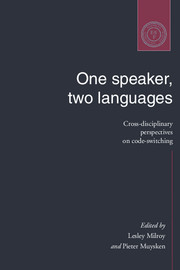Book contents
- Frontmatter
- Contents
- Notes on contributors
- Acknowledgments
- 1 Introduction: code-switching and bilingualism research
- Part one Code-switching in institutional and community settings
- 2 Bilingual speech of migrant people
- 3 Code-switching in the context of dialect/standard language relations
- 4 Code-switching in community, regional and national repertoires: the myth of the discreteness of linguistic systems
- 5 Code-switching in the classroom: two decades of research
- Part two Code-switching and social life
- Part three Grammatical constraints on code-switching
- Part four Code-switching in bilingual development and processing
- Index
4 - Code-switching in community, regional and national repertoires: the myth of the discreteness of linguistic systems
Published online by Cambridge University Press: 05 June 2012
- Frontmatter
- Contents
- Notes on contributors
- Acknowledgments
- 1 Introduction: code-switching and bilingualism research
- Part one Code-switching in institutional and community settings
- 2 Bilingual speech of migrant people
- 3 Code-switching in the context of dialect/standard language relations
- 4 Code-switching in community, regional and national repertoires: the myth of the discreteness of linguistic systems
- 5 Code-switching in the classroom: two decades of research
- Part two Code-switching and social life
- Part three Grammatical constraints on code-switching
- Part four Code-switching in bilingual development and processing
- Index
Summary
Dedicated to Norman Denison
In this paper I shall draw attention to a paradox. On the one hand, the study of code-switching coincided with, and was partly the product of, a realisation within linguistics that bilingualism was not an abnormal situation and that the linguistic behaviour which results from bilingualism could not be dismissed as arbitrary or aberrant. On the other hand, a lot of effort has been expended within the field of code-switching on setting up a new orthodoxy to replace the old orthodoxy of monolingual norms. This consists in defining code-switching as a special form of skilled bilingual behaviour, to be distinguished from the aberrant manifestations of bilingualism which involve one language influencing another. I will try to show that this new type of ideal speaker–listener, whose existence depends on such discrete alternation, is as much of a rare bird as Chomsky's monolingual original, and that code-switching should instead be considered as a much broader, blanket term for a range of interlingual phenomena within which strict alternation between two discrete systems is the exception rather than the rule.
Code-switching is found in a variety of linguistic contexts, ranging from that where highly educated bilinguals are talking among themselves, alternating between two codes which closely reflect the relevant monolingual norms, to situations where societal multilingualism is the general norm.
- Type
- Chapter
- Information
- One Speaker, Two LanguagesCross-Disciplinary Perspectives on Code-Switching, pp. 68 - 89Publisher: Cambridge University PressPrint publication year: 1995
- 46
- Cited by



